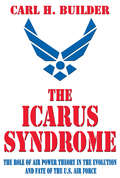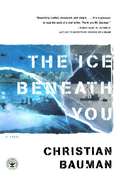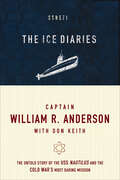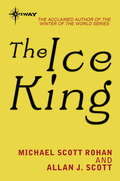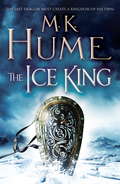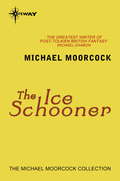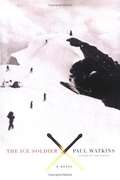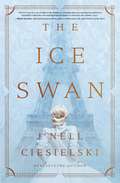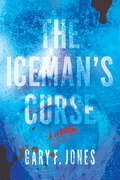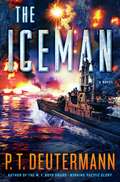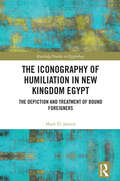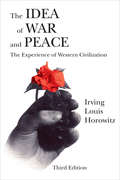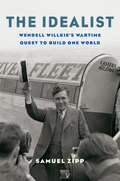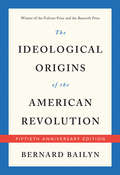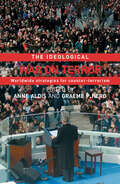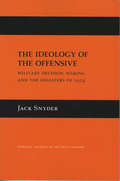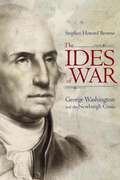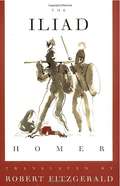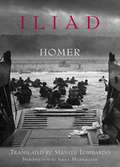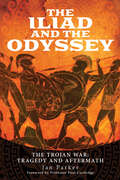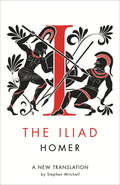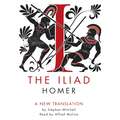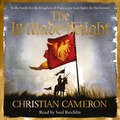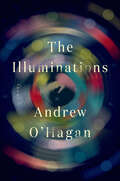- Table View
- List View
The Icarus Syndrome: The Role of Air Power Theory in the Evolution and Fate of the U.S. Air Force
by Carl H. BuilderAt the end of the Reagan era, many in the U.S. Air Force began to express their concerns about the health of their institution. They questioned whether the Air Force had lost its sense of direction, its confidence, its values, even its future. For some, these concerns reflected nothing more than the maturation of the most youthful of America's military institutions. For others it was a crisis of spirit that threatened the hard-won independence of the Air Force.Although the diagnoses for this malaise are as numerous as its symptoms, The Icarus Syndrome points a finger at the abandonment of air power theory sometime in the late 1950s to early 1960s as the single, taproot cause of the problems. That provocative diagnosis is followed by an equally provocative prescription the Air Force must follow to regain its institutional health.Author Carl H. Builder begins with an overview of this crisis of values within the Air Force, along with a litany of concerns about what seems to have gone wrong within that institution. The history of the U.S. Air Force, along with the role played in it by air power theory, is explored and is used to support Builder's thesis. The remainder of the book is an analysis of what went wrong and when, how these wrongs might be corrected, and the challenges for Air Force leadership in the future. Now available in paperback, The Icarus Syndrome will be of great interest to U.S. Air Force professionals, military and aviation historians, and institutional psychologists.
The Ice Beneath You
by Christian BaumanJust as The Things They Carried and Catch-22 spoke to their generations with truth and dark humor, this brilliant first novel defines the experience of war for its era. Benjamin Jones, twenty-three, discharged after an army tour in Somalia, heads cross-country on a Greyhound, seeking refuge on the West Coast. He has left behind his best friend, Trevor, and Liz Ross, a female soldier with whom Jones has fallen in love. But Jones has also left behind a tragedy -- a horrible, split-second action made in Somalia -- that Trevor, Jones, and the army have implicitly agreed to forget. Alone on the streets of San Francisco, and then north on the Washington coast, Jones finds that an uneducated ex-soldier is qualified only as a peep show fantasy object or as a hired hand to a bottom-feeding smuggler and pornographer. Recurring visions of his life as a soldier gradually reveal the full truth -- and agony -- of his experience, and a reunion with Liz and a violent confrontation with Trevor bring the young soldier's journey to a wrenching conclusion -- but one not without hope. At equal turns tense, brutal, and poetic, The Ice Beneath You is a soldier's story for a time when there weren't supposed to be any more soldiers' stories.
The Ice Diaries: The Untold Story of the USS Nautilus and the Cold War's Most Daring Mission
by William R. Anderson Don KeithThe greatest undersea adventure of the 20th century.The Ice Diaries tells the incredible true story of Captain William R. Anderson and his crew's harrowing top-secret mission aboard the USS Nautilus, the world's first nuclear-powered submarine. Bristling with newly classified, never-before-published information and photos from the captain's personal collection, The Ice Diaries takes readers on a dangerous journey beneath the vast, unexplored Arctic ice cap during the height of the Cold War."Captain Anderson and the crew of the USS Nautilus exemplified daring and boldness in taking their boat beneath the Arctic ice to the North Pole. This expertly told story captures the drama, danger, and importance of that monumental achievement." ?Capt. Stanley D. M. Carpenter, Professor of Strategy and Policy, United States Naval War College"Few maritime exploits in history have so startled the world as the silent, secret transpolar voyage of the U.S. Navy's nuclear submarine Nautilus, and none since the age of Columbus and Vasco da Gama has opened, in one bold stroke, so vast and forbidding an area of the seas." ?Paul O'Neil, Life magazine
The Ice King
by Allan J. Scott Michael Scott RohanA Viking temple. A Viking ship. Both preserved in the clinging, black mud of the North Yorkshire estuary. Press and TV watch over the archaeologists' shoulders as past and present merge. And while huge, death-cold creatures stalk and destroy through the blizzards of an eerily early winter, modern computer science and the dark night-knowledge of the old Norse gods disinter a terrible truth about a past that is sleeping, not dead.
The Ice King: A gripping adventure of courage and honour (Twilight of the Celts #3)
by M. K. HumeThe Last Dragon must create a kingdom of his own... Embarking on his ultimate voyage, Arthur, The Last Dragon, must brave the high seas and battle his way back to Britain in The Ice King, the explosive conclusion to M.K. Hume's Twilight of the Celts trilogy. The perfect read for fans of Bernard Cornwell and Ian Ross.'Historical fiction of the most bloodthirsty and roistering kind' - Australian Bookseller & Publishers Magazine It is several years now since Arthur, the Last Dragon of Britain, has set foot on home soil. Roaming the Land of the Denes, he has not only engaged in brutal and bloody conflict with the barbaric Geats, but he has also unearthed the most evil force within the royal court of Heorot. And, under the guidance of Stormbringer, the mighty Sae Dene king, he has honed his skills as a commander.Now the time has come for Arthur to brave the dangers of the frozen north as he and a band of daring sea-faring warriors prepare to embark on his ultimate voyage - to return to Britain and to create a kingdom of his own...What readers are saying about The Ice King: 'Wonderful storytelling does this book an enormous credit thus making it such a thrill to read from start to finish''An excellent completion of the Arthur trilogy - well constructed, good characters and a good read''Brilliant as usual. Five stars'
The Ice Schooner
by Michael MoorcockThe world lay frozen under a thousand feet of ice. Only in the Eight Cities of the Matto Grosso did men still live, hunting the wary ice whales for meat and oil, and following the creed of the Ice Mother which foretold the end of all life in ultimate cold.But legend told of a city far to the north - fabled New York - whose towers rose above the ice, whose crypts held the forgotten lore that might bring warmth to Earth once again. In the best ice ship in the Eight Cities, Konrad Arflane embarked on the impossible voyable to New York - an odyssey of incredible peril and adventure with a shattering discovery at the journey's end...
The Ice Soldier
by Paul WatkinsFrom the book jacket: The year is 1950 and Captain William Bromley, formerly one of the world's greatest mountaineers, has retired into obscurity. Having barely survived the infamous Palladino Road, high in the Italian Alps during WWII, Bromley has sworn he'll never climb again. It is only when a soldier from Bromley's old mountain regiment appears that his peaceful world begins to crumble. A terrifying request is made, and for reasons that have haunted Bromley since the battle at Palladino, he knows he cannot refuse. Bromley must now return to those same mountains that almost cost him his life, in order not only to confront the demons of his past, but to repay the debt that saved him years before. The little-known role of the army's mountaineer corps comes brilliantly to life in this story of a man pushed to the limits of endurance and survival, and haunted by the ghosts of war.
The Ice Swan
by J'nell CiesielskiAmid the violent last days of the glittering Russian monarchy, a princess on the run finds her heart where she least expects it.1917, Petrograd. Fleeing the murderous flames of the Russian Revolution, Princess Svetlana Dalsky hopes to find safety in Paris with her mother and sister. But the city is buckling under the weight of the Great War, and the Bolsheviks will not rest until they have erased every Russian aristocrat from memory. Svetlana and her family are forced into hiding in Paris&’s underbelly, with little to their name but the jewels they sewed into their corsets before their terrifying escape.Born the second son of a Scottish duke, the only title Wynn MacCallan cares for is that of surgeon. Putting his talents with a scalpel to good use in the hospitals in Paris, Wynn pushes the boundaries of medical science to give his patients the best care possible. After treating Svetlana for a minor injury, he is pulled into a world of decaying imperial glitter. Intrigued by this mysterious, cold, and beautiful woman, Wynn follows Svetlana to an underground Russian club where drink, dance, and questionable dealings collide on bubbles of vodka.Out of money and options, Svetlana agrees to a marriage of convenience with the handsome and brilliant Wynn, who will protect her and pay off her family&’s debts. It&’s the right thing for a good man to do, but Wynn cannot help hoping the marriage will turn into one of true affection. When Wynn&’s life takes an unexpected turn, so does Svetlana&’s—and soon Paris becomes as dangerous as Petrograd. And as the Bolsheviks chase them to Scotland, Wynn and Svetlana begin to wonder if they will ever be able to outrun the love they are beginning to feel for one another.&“The Ice Swan is a ray of light in the middle of a Europe that was sinking into darkness. Ciesielski&’s talent for storytelling from the heart is a feast for the readers&’ eyes.&” —Mario Escobar, international bestselling author of Remember Me and Children of the StarsAdventurous World War I historical romanceFor fans of Kate Quinn, Beatriz Williams, and Aimie K. RunyanFull-length, stand-alone novel (approx. 120,000 words)Includes discussion questions for book clubs
The Iceman's Curse
by Gary F. JonesNature, climate, and stupidity produce a pandemic.Grant Farnsworth, a post-doc student, veterinarian, and virologist at the University of Minnesota is upset when his professor tells him to prepare to work on tissue samples from a 1,200-year-old corpse called the Iceman, that was found in the Swiss Alps. Grant is already working seven days a week and his wife is eight months pregnant with their second child. The situation becomes more complicated when a Swiss professor, to avoid regulations, smuggles the samples into the United States, putting Grant and his professor in legal jeopardy.When a blizzard diverts the professor's flight to Chicago, Customs is hectic, and the professor mistakenly swaps his suitcase with Frank, a drug mule. When Frank discovers the mistake he and a friend follow the professor north on I-94 with the intention to do whatever is necessary to recover the missing drugs. When snow forces the professor to stop at a motel in the hamlet of Kirby, Wisconsin, he has no idea that he's carrying drugs and that his life is in jeopardy.When Switzerland announces that those who handled Iceman samples are ill, and several have died, Grant is sent to Kirby to find the Swiss professor and isolate the samples. At the same time, the CDC learns of the samples in Kirby and dispatches Dr. Sybil Erypet to Fort McCoy, a nearby Army base, to get the samples under control.Between dangerous drug mules and infected tissue samples, many lives in the snow-bound village are in jeopardy.
The Iceman: A Novel
by P. T. DeutermannThe Iceman is an action-packed World War II military thriller featuring a daring United States Navy submarine commander during the Pacific war in 1942-43.In 1942, off the port city of St. Nazaire in occupied France, a United States Navy S-class submarine assigned to the Royal Navy lurks just outside the borders of the minefield protecting a German U-boat base. Lieutenant Commander Malachi Stormes, the boat’s skipper, patrols dangerously close to the minefield entrance and manages to trap and sink three outbound U-boats in one spectacular attack. Britain decorates him, the U.S. Navy promotes him and then gives him command of a brand new class of submarine, a fleet boat called Firefish. Based in Perth, Australia, having been driven out of the Philippines by the Japanese juggernaut, the Perth boats are the only American forces capable of hitting the Japanese in the western Pacific.Stormes, with his cold, steely-eyed focus on killing Japanese ships, is an enigma to his officers and crew, especially when it becomes clear that he is willing to take huge chances to achieve results. Firefish sinks more ships than any Perth boat on her first war patrol, but Stormes’ unconventional tactics literally frighten his crew. Driven by a past steeped in the whiskey-haunted violence of the Kentucky coal fields, whose psychological scars torment his sleep and close him off from personal relationships, Stormes is nicknamed The Iceman. His crew is proud of their boat’s accomplishments, but wonder if their iron-willed skipper will bring them home alive.With intense action and featuring authentic submarine tactics in the early years of the Pacific war, The Iceman continues P. T. Deutermann's masterful, award-winning cycle of thrillers set during World War II.
The Icemen: A Novel of Antarctica
by M. E. MorrisWhen Navy Commander Marc leads his air squadron to Antarctica he is about to fall into an amazing plot to revive the Third Reich. Argentinians have decided to exile the war criminals to a base in the Antarctic Peninsula.
The Iconography of Humiliation in New Kingdom Egypt: The Depiction and Treatment of Bound Foreigners (Routledge Studies in Egyptology)
by Mark D. JanzenThis volume analyzes the iconography of bound foreigners on New Kingdom monuments and artifacts to better understand Egyptian perspectives on foreigners and their treatment of prisoners of war.Depictions of foreign captives in humiliating or torturous poses are ubiquitous in Egyptian iconography and reflect the celebratory nature of royal ideology, in this case by degrading enemies. Egyptologists have scrutinized these scenes for details regarding various military matters, but existing scholarly literature offers few studies focused on enemy captives and the sheer physical brutality of the depictions of their bindings. Janzen examines the bound foreigner motif in New Kingdom sources, demonstrating that these prisoners of war played vital roles in Egyptian ideology and religion. Their depictions in bizarre or torturous poses served to reinforce ideological underpinnings of pharaoh’s right to rule, perpetually ritualizing their defeat and/or punishment through the presence of this iconography on ceremonial objects used primarily by the king and on temple walls and monuments. The subjugation of foreigners also constituted an important economic function, as incorporating prisoners of war into the Egyptian workforce was crucial for economic prosperity and growth in New Kingdom Egypt. The volume also explores cross-cultural and anthropological parallels, placing Egyptian treatment of foreign prisoners in its ancient context.The book provides a fascinating study of the subject suitable for scholars and students of Egyptology and ancient history, particularly that of New Kingdom Egypt, as well as those working on power, warfare, and violence in the ancient world more broadly.
The Idea of War and Peace: The Experience of Western Civilization (Comparative Policy Evaluation Ser.)
by Irving HorowitzModern theorists and their ideas on war and peace are here presented, interpreted, and evaluated with scholarship and clarity of expression. In examining the main currents in modern social theory, the author has gone directly to the works of the leading philosophic figures. This book is a carefully documented analysis based on primary sources. Its republication in an expanded version after more than a half century since its initial appearance is a welcome addition to the literature on conflict and conflict resolution.In this 2007 greatly expanded third edition of The Idea of War and Peace, Irving Louis Horowitz provides a sense of substance to the character of Western Civilization. The book permits the reader to better understand what the "clash of civilizations" is about. It provides a broad outline of both European and American twentieth century social philosophies as they relate to the issue of war and peace. It also offers a new concluding section that explores in depth this same theme in the first decade of the twenty-first century.Such major figures as Bertrand Russell, John Dewey, Jacques Maritain, Albert Einstein, and Vladimir Lenin, reviewed in earlier editions, are now joined by examinations of the work of Raymond Aron, Harold D. Lasswell, and other contemporaries. The Idea of War and Peace is not just one more manual of how to conduct or avoid conflict, and even less, a guideline to policy-making. Instead, the work offers a profound sense of the theories and values that underline manuals and guides.This third edition is graced by a consideration of major figures in the second half of the twentieth century and a retrospective on the work of Niccolo Machiavelli on the nature of warfare. It also includes chapters on the relationship of war, peace, and the democratic order--and a postscript on new forms of state power and terrorism. This new edition links past and present and serves as an analytical bridge between cen
The Idealist: Wendell Willkie’s Wartime Quest to Build One World
by Samuel ZippWendell Willkie lost the 1940 presidential election but became America’s most effective ambassador, embarking on a 7-week plane trip to bolster the allied cause, encountering everyone from de Gaulle and Stalin to Chiang Kai-shek. Against a wave of nationalism, Willkie promoted a message of global interconnection and peaceful engagement.
The Ideological Origins of the American Revolution: Fiftieth Anniversary Edition
by Bernard BailynThe Ideological Origins of the American Revolution is a classic of American historical literature—required reading for understanding the Founders’ ideas and their struggles to implement them. In the preface to this 50th anniversary edition, Bernard Bailyn isolates the Founders’ profound concern with the uses and misuses of power.
The Ideological War on Terror: Worldwide Strategies For Counter-Terrorism (Political Violence)
by Graeme P. Herd Anne AldisThis edited book addresses the appropriateness of US and other counter-terrorist (CT) strategies in Europe and Eurasia, the Middle East, the Asia Pacific region and in Latin America, with a view to improving their effectiveness. The book has three main objectives: to re-examine terrorists' strategic goals and sources of legitimacy and the nature of their ideological support to analyze current US and regional CT strategies and assess their success in de-legitimizing terrorists and undermining their support to provide a strategic synthesis and policy recommendations in light of the research findings. This book will be of interest to students of political violence and terrorism, security studies and international relations in general.
The Ideology of the Offensive
by Jack SnyderJack Snyders analysis of the attitudes of military planners in the years prior to the Great War offers new insight into the tragic miscalculations of that era and into their possible parallels in present-day war planning. By 1914, the European military powers had adopted offensive military strategies even though there was considerable evidence to support the notion that much greater advantage lay with defensive strategies. The author argues that organizational biases inherent in military strategists attitudes make war more likely by encouraging offensive postures even when the motive is self-defense. Drawing on new historical evidence of the specific circumstances surrounding French, German, and Russian strategic policy, Snyder demonstrates that it is not only rational analysis that determines strategic doctrine, but also the attitudes of military planners. Snyder argues that the use of rational calculation often falls victim to the pursuit of organizational interests such as autonomy, prestige, growth, and wealth. Furthermore, efforts to justify the preferred policy bring biases into strategists decisions biases reflecting the influences of parochial interests and preconceptions, and those resulting from attempts to simplify unduly their analytical tasks. The frightening lesson here is that doctrines can be destabilizing even when weapons are not, because doctrine may be more responsive to the organizational needs of the military than to the implications of the prevailing weapons technology. By examining the historical failure of offensive doctrine, Jack Snyder makes a valuable contribution to the literature on the causes of war.
The Ides of War: George Washington and the Newburgh Crisis (Studies in Rhetoric & Communication)
by Stephen Howard BrowneA history and analysis of how George Washington stopped an attempted military coup at the end of the American Revolutionary War.History tells us that on a day when the forces of civil government confront the forces of military might, no one knows what may follow. Americans believe that they have avoided this moment, that whatever other challenges the country has faced, at least it never has had to deal with the prospects of a coup d’état. Stephen Howard Browne maintains that this view is mistaken, that in fact the United States faced such a crisis, at the very moment when the country announced its arrival on the world scene in the spring of 1783 in a rustic meeting hall along the Hudson River near Newburgh, New York. The crisis was resolved by George Washington, commander in chief of the US Army, in an address he delivered to a roomful of restive and deeply disaffected officers.In The Ides of War, Browne examines the resolution of the first confrontation between the forces of American civil government and the American military—the Newburgh Crisis. He tells the story of what transpired on that day, examines what was said, and suggests what we might learn from the affair. Browne shows that George Washington’s Newburgh Address is a stunning example of the power of human agency to broker one of our most persistent, most troublesome dilemmas: the rival claims to power of civil and military authorities. At stake in this story are biding questions about the meaning and legacy of revolution, the nature of republican government, and ultimately what kind of people we are and profess to be.Browne holds that although these are monolithic and vexed themes, they are vital and need to be confronted to obtain a coherent and convincing account of history. The Newburgh Crisis offers an unmatched opportunity to examine these themes, as well as the role of rhetoric in the founding of the world’s first modern republic.“Few speeches have shaped the course of American history more than George Washington’s address to his potentially mutinous officers in Newburgh, New York, on March 15, 1783. In this splendid book, Browne deftly brings to life the Newburgh conspiracy, Washington’s masterful response to it, and the lasting implications of both for civil-military relations in a republican government.” —Stephen Lucas, Evjue-Bascom Professor in the Humanities, University of Wisconsin“This elegant and persuasive book expands our knowledge of a little known but hugely significant turning point in American history, one that set it on course toward liberty and democracy. In the process, Browne brings new understanding to the founding of the United States, its military system, and its first commander in chief.” —Richard H. Kohn, professor emeritus of history and peace, war, and defense, University of North Carolina at Chapel Hill
The Iliad
by Homer Robert FitzgeraldThis definitive translation of Homer's epic is timeless in its authority and always fresh in its vivid rendering of the pre-eminent war story of the Western world.
The Iliad
by Homer Stanley LombardoThe Iliad is the story of a raging anger and its human toll. The poem recounts "the rage of Achilles," the greatest of the Greek heroes fighting in the war against Troy. The Iliad draws us into a world of warrior aristocrats for whom honor, gained and regained in the front lines of battle, is paramount.
The Iliad and the Odyssey: The Trojan War: Tragedy and Aftermath
by Jan ParkerThe Iliad dealing with the final stages of the Trojan War and The Odyssey with return and aftermath were central to the Classical Greeks' self identity and world view. Epic poems attributed to Homer, they underpinned ideas about heroism, masculinity and identity; about glory, sacrifice and the pity of war; about what makes life worth living. From Achilles, Patroclus and Agamemnon in the Greek camp, Hektor, Paris and Helen in Troy's citadel, the drama of the battlefield and the gods looking on, to Odysseus' adventures and vengeful return - Jan Parker here offers the ideal companion to exploring key events, characters and major themes. A book-by-book synopsis and commentary discuss the heroes' relationships, values and psychology and the narratives' shimmering presentation of war, its victims and the challenges of return and reintegration. Essays set the epics in their historical context and trace the key terms; the 'Journey Home from War' continues with 'Afterstories' of both heroes and their women. Whether you've always wanted to go deeper into these extraordinary works or are coming to them for the first time, The Iliad and the Odyssey: The Trojan War, Tragedy and Aftermath will help you understand and enjoy Homer's monumentally important work.
The Iliad: A New Translation
by HomerA stunning new translation of the classic tale of the fall of Troy from one of the world's finest translators. If you enjoyed THE SONG OF ACHILLES, discover the original and the best...Man seduces another's wife then kidnaps her. The husband and his brother get a gang together to steal her back and take revenge. The woman regrets being seduced and wants to escape, whilst the man's entourage resent the position they have been placed in. Yet the battle lines have been drawn and there is no going back...Not the plot of the latest Hollywood thriller, but the basis of the ILIAD - the Greek classic that details the war between the Greeks and the Trojans after the kidnapping of Helen of Sparta. Based on the recent, superb, M.L. West edition of the Greek, this ILIAD is more readable and moving than any previous version. Thanks to the scholarship and poetic power of the highly acclaimed Stephen Mitchell, this new translation recreates the energy and simplicity, the speed, grace, and continual thrust and pull of the original, while the ILIAD's ancient story bursts vividly into life. This edition also includes book 10 as an appendix, making it indispensible for students and lay readers alike.
The Iliad: A New Translation
by HomerMan seduces another's wife then kidnaps her. The husband and his brother get a gang together to steal her back and take revenge. The woman regrets being seduced and wants to escape, whilst the man's entourage resent the position they have been placed in. Yet the battle lines have been drawn and there is no going back...Not the plot of the latest Hollywood thriller, but the basis of the ILIAD - the Greek classic that details the war between the Greeks and the Trojans after the kidnapping of Helen of Sparta. Based on the recent, superb, M.L. West edition of the Greek, this ILIAD is more readable and moving than any previous version. Thanks to the scholarship and poetic power of the highly acclaimed Stephen Mitchell, this new translation recreates the energy and simplicity, the speed, grace, and continual thrust and pull of the original, while the ILIAD's ancient story bursts vividly into life. This edition also includes book 10 as an appendix, making it indispensible for students and lay readers alike.Read by Alfred Molina(p) 2011 Simon & Schuster
The Ill-Made Knight: ‘The master of historical fiction’ SUNDAY TIMES (Chivalry #1)
by Christian Cameron'Brilliantly evoked' SUNDAY TIMESDiscover the first medieval adventure in the action-packed Chivalry series! Perfect for fans of Bernard Cornwell, Simon Scarrow and Conn Iggulden.September, 1356. Poitiers. The greatest knights of the age were ready to give battle.On the English side, Edward, the Black Prince, who'd earned his spurs at Crecy.On the French side, the King and his son, the Dauphin. With 12,000 knights. And then there is William Gold. A cook's boy - the lowest of the low - who had once been branded as a thief. William dreams of being a knight, but in this savage new world of intrigue, betrayal and greed, first he must learn to survive. As rapacious English mercenaries plunder a country already ravaged by plague, and the peasantry take violent revenge against the French knights who have failed to protect them, is chivalry any more than a boyish fantasy?'A sword-slash above the rest' IRISH EXAMINER'One of the finest writers of historical fiction in the world' BEN KANE
The Illuminations: A Novel
by Andrew O'Hagan“Both a howl against the war in Afghanistan . . . and a multilayered, deeply felt tale of family, loss, memory, art, loyalty, secrecy and forgiveness.” —The New York Times Book ReviewLonglisted for the Man Booker PrizeAnne Quirk’s life is built on stories—the lies she was told by the man she loved and the fictions she told herself to survive. Nobody remembers Anne now, but in her youth she was an artistic pioneer, a creator of groundbreaking documentary photographs. Her beloved grandson Luke, a captain with the Royal West Fusiliers in the British army, has inherited her habit of transforming reality. When his mission in Afghanistan goes horribly wrong, he returns to Scotland, where the secrets that have shaped his family begin to emerge. He and Anne set out to confront a mystery from her past among the Blackpool Illuminations—the dazzling lights that brighten the seaside town as the season turns to winter.“Like its two main characters, this impressive novel has a double life, moving with imaginative daring between war and art, photography and fiction, and memory and secrets.” —The Guardian“Hypnotic . . . The Illuminations doesn’t exactly follow a plumb line: It shifts in time, perspective and place. But it’s occasionally lit up with a flash that makes the pieces of Anne’s story clear. It’s worth the trip into the dark.” —The Globe and Mail“A clever, expansive and powerfully charged novel about family connections and the unreliability of memory.” —Star Tribune“A lean yet rich family story built of small and crucial moments in memories and reality across three generations.” —Kirkus Reviews (starred review)
